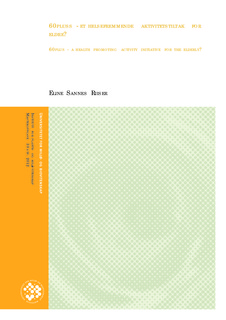60pluss : et helsefremmende aktivitetstiltak for eldre?
Master thesis
Permanent lenke
http://hdl.handle.net/11250/189449Utgivelsesdato
2012-06-18Metadata
Vis full innførselSamlinger
- Master's theses (IPM) [204]
Sammendrag
I denne studien utforskes et av Oslos aktivitetstiltak for eldre, 60pluss. Helsefremmende arbeid gjennom fysisk og sosial aktivitet for friske, inaktive eldre er valgt som tema i denne oppgaven. Vi står i dag overfor utfordringer knyttet til endringer i den demografiske utviklingen. At vi lever lenger er et resultat av blant annet bedrede levekår og et godt helsevesen, men i den offentlige debatten ser utfordringene ut til å overskygge det faktum at et aldrende samfunn er et resultat av en positiv utvikling. Verdens helseorganisasjon ønsker gjennom handlingsprogrammet «Active Aging» å sette lys på funksjonell uavhengighet som omhandler hvordan eldre kan leve selvstendig i samfunnet lengst mulig. Denne oppgaven ønsker å løfte frem et konkret aktivitetstiltak, og spør om hvordan medlemmene av 60pluss opplever og erfarer at aktivitetene de deltar i har betydning for egen helse og livssituasjon. Sammenhengen mellom fysisk/sosial aktivitet og helse er relativt godt dokumentert, men det finnes lite kunnskap om 60pluss og hvilke konkrete faktorer som kan bidra til god helse for deltagerne i dette tiltaket.
Som metodisk tilnærming ble det foretatt tre fokusgruppeintervju med totalt 20 deltagere. Alle informantene var over 60år, pensjonister og aktive turgåere i tiltaket 60pluss. Observasjon ble gjennomført som en supplerende forskningsmetode. Oppgavens teoretiske fundament omfatter primært en modell basert på konseptet om tilgang til ressurser (ressursmodellen), men temaet knyttes også til modellen ICF (International classification of functioning,
disability and health). Disse to modellene identifiserer determinanter som påvirker eldres atferd og helse, og ses i sammenheng med studiens funn. Funn i studien viser at muligheten til å engasjere seg i aktiviteter som består av uforpliktende fysisk og sosial aktivitet, aktivitet som fremmer trivsel og glede, som består av faste avtaler ukentlig, som tilrettelegger for variasjon i funksjonsnivå, som fremmer sosial tilhørighet og
sosiale relasjoner og med et fokus på integrering i nærmiljøet er faktorer som påvirker deltagernes helse og livssituasjon. Denne kunnskapen kan være nyttig for utøvelse av helsefremmende tiltak rettet mot eldre i andre kommuner. In this study I have chosen to study one of Oslo’s activity initiatives for the elderly, 60plus. The subject of this assignment is health promoting work through physical and social activity aimed at healthy, inactive elders. Today we are facing challenges related to changes in the demographic development. The fact that we live longer is a result of improved conditions of living and a good health service, but in public debate the challenges seem to overshadow the
fact that an aging society is a result of a positive development. Through a programme of action called «Active Aging», The World Health Organization wishes to shed light on the term functional independency, concerning how elderly can live independently in society for as long as possible. This assignment wishes to focus on one particular activity initiative, and seeks to find out how the members of 60plus experience their partaking in the activities
having an influence on their own health and situation of life. The relation between physical/social activity and health is relatively well documented, but there is little knowledge of 60plus and what specific factors can contribute to good health for the participants of this initiative. As a methodical approach, three focus group interviews were carried out, with a total of 20 participants. All of the informants were above the age of 60, pensioners and active members of the 60plus initiative. Observation was carried out as a supplementary research method. The
theoretical fundament of the assignment is primarily based on the resource model – a model based on the concept of access to resources, but the subject is also related to the ICF-model (International classification of functioning, disability and health). These two models identify determinants affecting the behavior and health of elders, and are seen in relation with the results of this study.
Results of this study show that the possibility to commit oneself to activities including nonbinding physical and social activity, activities promoting well-being and pleasure consisting of weekly, regular activities, promoting social relations and a sense of social belonging, with a focus on integration in the local community are all factors which affect the participants’ health and situation of life. This knowledge can be useful when health promoting initiatives
aimed towards the elderly are put into practice in other municipalities.
Key words: Functional independency, physical activity, social activity, health, aging
